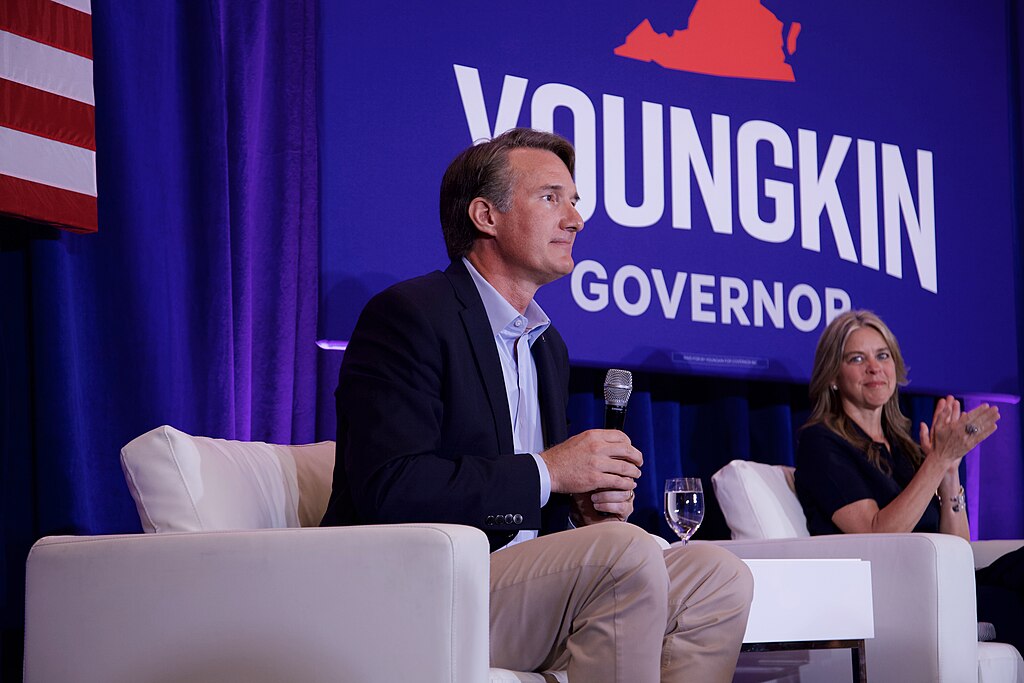The U.S. Department of Justice (DOJ) has filed a lawsuit against the state of Virginia, accusing it of violating federal voting laws by purging voter rolls too close to Election Day. The lawsuit, announced Friday, marks the second time in a month that the DOJ has taken legal action against a state for violating the National Voter Registration Act of 1993.
The DOJ claims that Virginia’s efforts to clean up its voter rolls, initiated by Republican Gov. Glenn Youngkin, may have disenfranchised hundreds, if not thousands, of eligible voters. Under an executive order signed by Youngkin, the state’s Department of Elections was required to conduct daily updates to voter rolls, targeting individuals identified as “noncitizens.” Local officials were then tasked with notifying individuals whose names appeared on both the noncitizen and voter lists that their registration would be canceled if they failed to respond and affirm their citizenship within 14 days.
However, the DOJ argues that some of the individuals flagged as noncitizens are, in fact, U.S. citizens. This led to the erroneous cancellation of their voter registrations. “The Commonwealth’s unlawful actions here have likely confused, deterred, and removed U.S. citizens who are fully eligible to vote,” the DOJ lawsuit states, pointing to the very concerns Congress sought to prevent with the Quiet Period Provision, which prohibits voter roll purges within 90 days of an election.
One previous voter roll purge in Virginia’s Prince William County, conducted before July, identified 162 alleged noncitizens, 43 of whom were later determined to be U.S. citizens, according to the DOJ’s findings.
In a fiery response, Gov. Youngkin dismissed the lawsuit as “politically motivated,” calling it a “desperate attempt to undermine the legitimacy of elections in the Commonwealth.” Youngkin, an ally of former President Donald Trump, insisted that Virginians would see through the DOJ’s actions. Trump also weighed in on the lawsuit, posting on Truth Social, “We must protect American Voters, and protect America’s Democracy!” He accused the DOJ and Vice President Kamala Harris of seeking to undermine the democratic process.
This lawsuit is the second of its kind in recent weeks. Last month, the DOJ sued Alabama for similar alleged violations of the National Voter Registration Act, specifically its Quiet Period Provision, which restricts large-scale voter roll purges within three months of federal elections.
The Virginia Department of Elections declined to comment on the lawsuit, citing pending litigation. The state’s elections commissioner, also named in the suit, did not respond to requests for comment.
Meanwhile, the Virginia Coalition for Immigrant Rights (VCIR) praised the DOJ’s legal action. The coalition had filed its own lawsuit against Gov. Youngkin earlier this week, alleging that his voter purge program was discriminatory and riddled with errors. “The executive order has disenfranchised hundreds, if not thousands, of eligible voters on the eve of an election,” said Monica Sarmiento, executive director of VCIR, in a statement. “We applaud the DOJ for joining us in challenging this unlawful program.”
As the legal battle intensifies, Virginia remains a critical battleground. The state, which has consistently voted Democratic in recent presidential elections, is now under the political microscope as the upcoming Senate race between Democratic incumbent Sen. Tim Kaine and Republican nominee Hung Cao unfolds.
With tensions running high just weeks before the election, both sides are preparing for a fierce fight over voter rights and election integrity.



 Zelenskiy Urges Change in Iran After U.S. and Israeli Strikes, Cites Drone Support for Russia
Zelenskiy Urges Change in Iran After U.S. and Israeli Strikes, Cites Drone Support for Russia  Netanyahu Suggests Iran’s Supreme Leader Khamenei May Have Been Killed in Israeli-U.S. Strikes
Netanyahu Suggests Iran’s Supreme Leader Khamenei May Have Been Killed in Israeli-U.S. Strikes  Pakistan-Afghanistan Tensions Escalate as Taliban Offer Talks After Airstrikes
Pakistan-Afghanistan Tensions Escalate as Taliban Offer Talks After Airstrikes  Macron Urges Emergency UN Security Council Meeting as US-Israel Strikes on Iran Escalate Middle East Tensions
Macron Urges Emergency UN Security Council Meeting as US-Israel Strikes on Iran Escalate Middle East Tensions  Suspected Drone Strike Hits RAF Akrotiri Base in Cyprus, Causing Limited Damage
Suspected Drone Strike Hits RAF Akrotiri Base in Cyprus, Causing Limited Damage  Trump Launches Operation Epic Fury: U.S. Strikes on Iran Mark High-Risk Shift in Middle East
Trump Launches Operation Epic Fury: U.S. Strikes on Iran Mark High-Risk Shift in Middle East  UK Accepts U.S. Request to Use British Bases for Defensive Strikes on Iranian Missiles
UK Accepts U.S. Request to Use British Bases for Defensive Strikes on Iranian Missiles  U.S.-Israel Strike on Iran Escalates Middle East Conflict, Trump Claims Khamenei Killed
U.S.-Israel Strike on Iran Escalates Middle East Conflict, Trump Claims Khamenei Killed  Israel Declares State of Emergency as Iran Launches Missile Attacks
Israel Declares State of Emergency as Iran Launches Missile Attacks  Trump Warns Iran as Gulf Conflict Disrupts Oil Markets and Global Trade
Trump Warns Iran as Gulf Conflict Disrupts Oil Markets and Global Trade  Trump to Address Nation as U.S. Launches Strikes in Iran, Axios Reports
Trump to Address Nation as U.S. Launches Strikes in Iran, Axios Reports  Australia Rules Out Military Involvement in Iran Conflict as Middle East Tensions Escalate
Australia Rules Out Military Involvement in Iran Conflict as Middle East Tensions Escalate  Germany and China Reaffirm Open Trade and Strategic Partnership in Landmark Beijing Visit
Germany and China Reaffirm Open Trade and Strategic Partnership in Landmark Beijing Visit  Russia Signals Openness to U.S. Security Guarantees for Ukraine at Geneva Peace Talks
Russia Signals Openness to U.S. Security Guarantees for Ukraine at Geneva Peace Talks  Trump Says U.S. Combat Operations in Iran Will Continue Until Objectives Are Met
Trump Says U.S. Combat Operations in Iran Will Continue Until Objectives Are Met  Trump Floats “Friendly Takeover” of Cuba as Rubio Reportedly Engages in Talks
Trump Floats “Friendly Takeover” of Cuba as Rubio Reportedly Engages in Talks  Pentagon Leaders Monitor U.S. Iran Operation from Mar-a-Lago
Pentagon Leaders Monitor U.S. Iran Operation from Mar-a-Lago 































